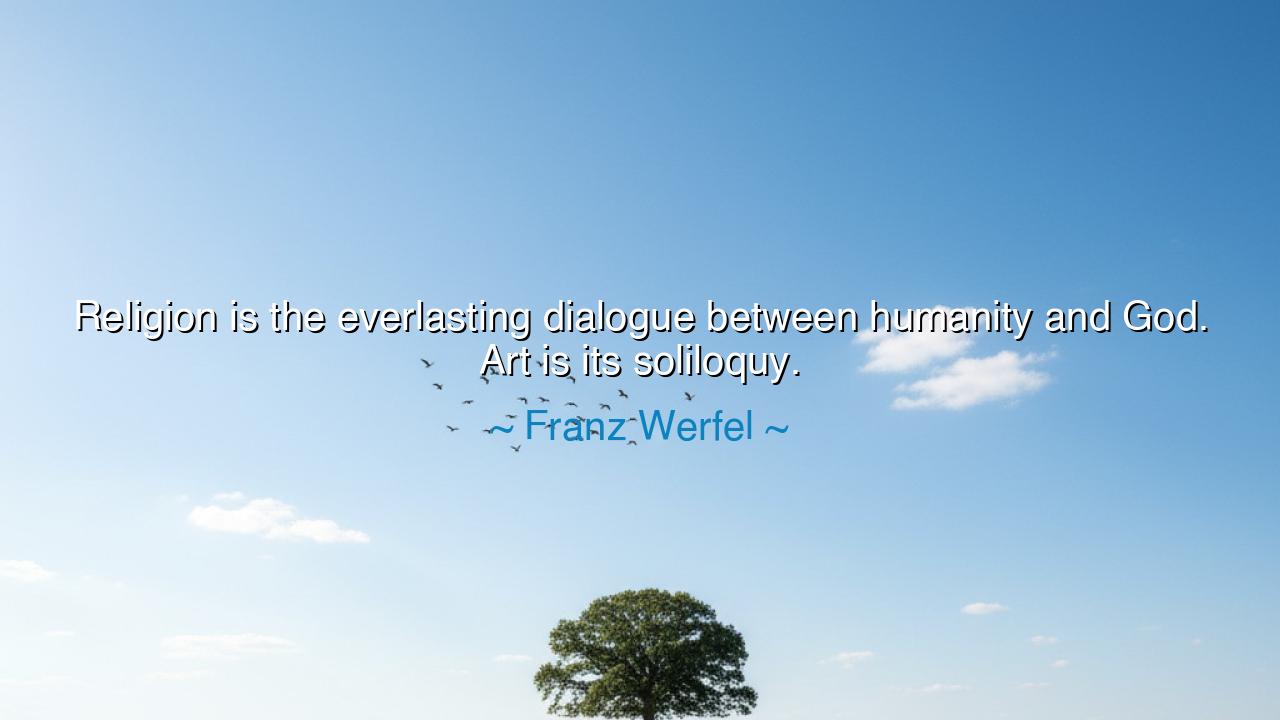
Religion is the everlasting dialogue between humanity and God.






“Religion is the everlasting dialogue between humanity and God. Art is its soliloquy,” wrote Franz Werfel, the Austrian poet and novelist whose words shimmer with both mysticism and clarity. In this profound utterance, he captures the twin impulses that define the human spirit — the yearning to speak with the divine, and the need to speak from the divine within. Religion is the bridge, stretching from earth to heaven, across which humanity cries out to its Maker and listens for an answer. Art, however, is the echo of that exchange — the solitary voice of the soul reflecting upon the infinite, a confession whispered into eternity when no reply is heard.
The origin of Werfel’s quote springs from his life as a man of faith and imagination, living amid the turmoil of the early twentieth century — an age of both spiritual hunger and moral despair. Born to a Jewish family in Prague, Werfel was surrounded by the clash of cultures, philosophies, and faiths. He saw firsthand how religion could be both the balm and the battlefield of mankind. Yet he also understood that the impulse behind every faith — to reach beyond the self toward something higher — was the same impulse that creates art. For him, religion was the dialogue between the mortal and the divine, and art was the human heart continuing that dialogue when the heavens grew silent.
In calling religion a “dialogue,” Werfel evokes the eternal exchange that has shaped civilization itself. From the hymns of the Vedas to the psalms of David, from the chants of the desert prophets to the meditations of monks and mystics, humanity has always sought to speak with God. It is the dialogue of the finite with the infinite, the clay seeking its sculptor. Religion asks, “Who made me? Why am I here?” and in its asking, it binds humanity together in shared wonder. Every temple and mosque, every church and shrine, is a page in that vast conversation written by the yearning of countless souls.
Yet, when that dialogue turns inward, it becomes art. Art is the soliloquy — the lone voice of the human soul, speaking not to a god above, but to the divine spark within. When the painter lifts his brush, when the poet shapes her verse, when the musician breathes life into the silent air, they are not merely creating — they are praying in another language. For in every true work of art lies a fragment of the sacred. Just as religion seeks communion with the divine, art seeks revelation through the self. It is the confession of a spirit standing before its own mystery, saying: “This, too, is God speaking through me.”
Consider the story of Michelangelo, the sculptor who freed angels from marble. When asked how he created his masterpieces, he replied, “I saw the angel in the stone, and I carved until I set him free.” In those words lies Werfel’s truth: Michelangelo was not simply crafting beauty; he was continuing the dialogue of religion through the language of art. His chisel was his prayer, his silence his listening, his creation his response. In his soliloquy, the artist became a priest — not of a temple built by hands, but of one built by vision and spirit.
But Werfel’s insight also carries a warning: when the dialogue ends, when humanity ceases to speak with the divine, it risks losing the voice that creates. Art without spirit becomes hollow; religion without imagination becomes blind. The two are twins of the same longing — one reaching upward, the other inward. When joined, they reveal the fullness of what it means to be human: a being capable of reverence and creation, of devotion and expression, of silence and song.
So, dear listener, what lesson shall you take from this? It is this: keep alive both the dialogue and the soliloquy. Speak with the divine through prayer, through reflection, through wonder — but also let your soul answer back through creation. Paint, sing, write, build, love — for each act of creation is your echo in the great conversation between heaven and earth. Do not let your spirit grow silent, for silence without awe becomes emptiness. Let your faith feed your art, and let your art renew your faith.
And when you look upon your life, see it as Werfel did — as a living work of both dialogue and soliloquy. Speak to the heavens, yes — but also listen to the whisper within. For in that union lies the eternal rhythm of existence: the voice of humanity calling to God, and the echo of art returning, like a song carried on the wind, answering back to eternity.






AAdministratorAdministrator
Welcome, honored guests. Please leave a comment, we will respond soon